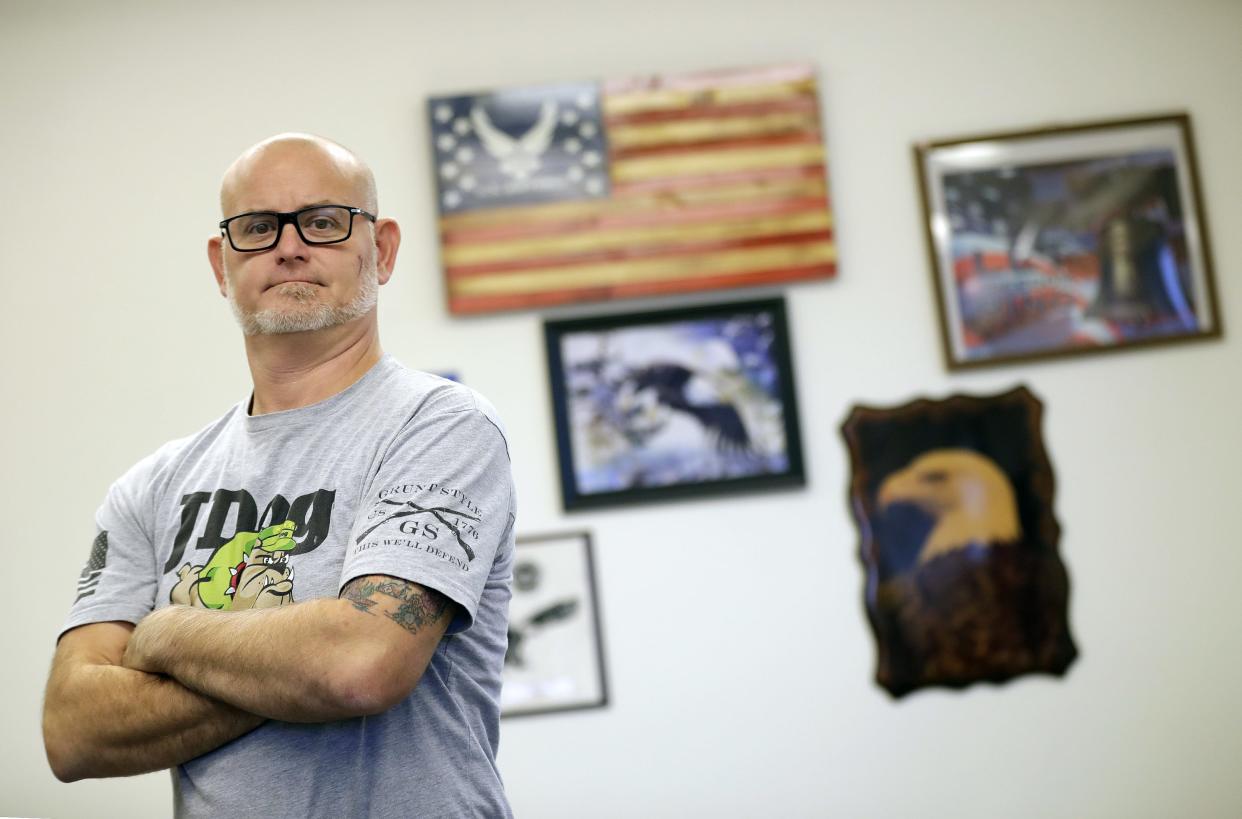Veterans contribute $400 million to Brown County's economy, yet many need help

GREEN BAY − Richard White wanted to keep serving the community after his time in the U.S. Navy was over. With years of experience in retail and business management, he found a job with a company that he believes offers a valuable local service.
"This gives us (veterans) that opportunity again," he said of his employer, "to go out and help our community, be something a little bit bigger than what we are."
White served four years in the Navy aboard the USS Wisconsin, stationed north of Virginia. He had planned a move to Florida to start a franchise of a veteran-owned company, JDog Junk Removal and Hauling, when an accident in Green Bay left him with a neck injury that changed those expectations.
Instead of starting his company, White became operations manager at a JDog franchise that serves the Brown County area, Fox Valley and as far as Milwaukee and Madison; its central offices are at 312 W. Northland Ave. in Appleton.
The franchise, owned by a married military veteran couple, focuses on junk removal and hauling, but White says they offer a wide umbrella of services.
Catherine Peters started the Fox Valley-based franchise in 2020, and since then it has seen a 27% increase in revenue. Now with 14 employees, the local JDog business expects to move to a new location in Little Chute that will allow for more storage capacity, Peters said via email.
According to the company's website, the JDog franchise donates 25% of what it hauls to veterans organizations, Goodwill and other charities.
Veteran-run businesses and veteran workers generate hundreds of millions of dollars a year in economic impact across northeast Wisconsin while filling an array of niches. Still, many veterans rely on social benefits as they struggle to maintain employment and suffer from mental health issues, addiction and homelessness.
U.S. veteran businesses produce millions a year
The U.S. Department of Veterans Affairs has a budget of $338.73 billion for the 2022 fiscal year for benefits programs and departmental administration. Of that, Wisconsin receives $3.5 billion for its 390,000 veterans, said Joseph Aulik, director of the veterans service office in Brown County.
Brown County has 15,000 veterans and 5,000 widows of veterans, he said, all of whom can participate in Veterans Affairs programs for insurance and indemnities, compensation and pension, education and vocational rehabilitation and employment, medical expenditures, construction and loans.
"We have to remember these people volunteered to go and serve the country," Aulik said.
This year, veterans in Brown County have been paid $6.2 million in benefits claims. Benefits in Brown County are close to $130 million every year. Adding labor income and other income, plus $196.6 million in goods and services, Aulik said veterans have an economic impact of a little more than $400 million in Brown County's economy.
"Veterans are highly sought out for employment because of their dedication and commitment," he said. "In the end, all that money goes into the economy in many different ways."
Veterans own 9.1 % of all U.S. businesses, employing nearly 6 million Americans and generating $1 trillion in annual receipts, according to a recent report by SCORE.org, a mentor business network which helps entrepreneurs and small business owners all over the country.
Despite impact, many veterans still lack basics
Nonetheless, there are veterans who are struggling just to maintain a consistent source of food, safety and shelter.
As of August, there were 76 homeless veterans in shelters in Green Bay, said Gail Nohr, secretary of the Veterans 1st NEW. The nonprofit aims to provide a safe, supportive veteran community of tiny homes for local veterans in need of transitional and affordable housing.
With Kim Nohr, her husband and president of the nonprofit, they plan to build a village of 19 small homes that could offer housing to veterans. The organization is working with the city to determine where this village will be placed.
Even though homelessness in Wisconsin has been trending down from 2009 when it peaked at 11.6 per 10,000 people, according to reports by the National Alliance to End Homelessness, each homeless person costs taxpayers around $36,000 a year. Gail Nohr, a veteran herself, says her nonprofit could help reduce that cost by 50%.
"We've got to offer them services; we've got to do more than the status quo," she said.
Veterans 1st NEW drew inspiration from the James A. Peterson Veteran Village in Racine, but Nohr said she hopes her nonprofit can offer even more services. It's her vision and mission to rehabilitate veterans and offer them a way out from the mental health issues and economic problems they might be facing.
"We want to offer safe housing first and then work on substance abuse and mental health," she said, :"because when you are homeless you can't concentrate on those things."
The nonprofit could house nine homeless veterans per 12 to 24 months with services that could help them become better equipped to live on their own. It will also offer affordable tiny homes to 16 veterans for as long as needed.
Some services the organization is looking to offer are mental health, substance abuse as well as dog and horse therapy, career training, job placement, financial literacy, spiritual support, woodworking classes, fishing trips and gardening.
Once the facility is up and running, Kim Nohr said it will generate 75% of revenues from the rent and 25% from grants. They expect to lower the costs of construction with different partnerships and receive donations from local unions and companies like Home Depot.
The Veteran 1st village would be the first project in Brown County, he said, but he hopes it won't be the last.
Ariel Perez is a business reporter for the Green Bay Press-Gazette. You can reach him at APerez1@gannett.com or view his Twitter profile at @Ariel_Perez85.
This article originally appeared on Green Bay Press-Gazette: Brown County veterans add $400 million to economy but some suffer

